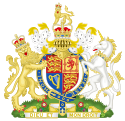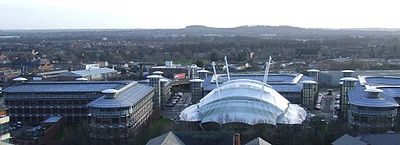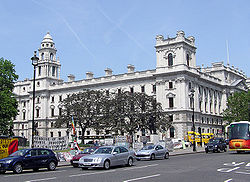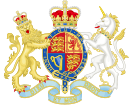- HM Revenue and Customs
-
Her Majesty's Revenue and Customs Cyllid a Thollau Ei Mawrhydi (Welsh) 
Non-ministerial government department overview Formed April 18, 2005 Preceding agencies Inland Revenue
Her Majesty's Customs and ExciseJurisdiction United Kingdom Headquarters 100 Parliament Street, London, SW1A 2BQ Employees 67,000[1] FTE Annual budget £4.09bn (2009–2010) [2] Minister responsible David Gauke MP, Exchequer Secretary to the Treasury and Minister responsible for HMRC Non-ministerial government department executive Dame Lesley Strathie, Chief Executive Child Non-ministerial government department Valuation Office Agency Key document Commissioners for Revenue and Customs Act 2005 Website www.hmrc.gov.uk Taxation in the United Kingdom 
This article is part of the series:
Politics and government of
the United KingdomCentral government HM Treasury
HM Revenue and Customs
Income tax · PAYE
VAT · National Insurance
Corporation tax
Inheritance tax · Stamp duty
Capital gains tax · Excise tax
Motoring taxesLocal government Council Tax · Rates · Business rates Taxation by country- Australia
British Virgin Islands
Canada · China
Colombia · France
Germany · Hong Kong
India · Indonesia
Ireland · Netherlands
New Zealand · Peru
Russia · Singapore
Switzerland · Tanzania
United Kingdom
United States
European Union -
Tax rates around the world
Tax revenue as % of GDP -
• project Her Majesty's Revenue and Customs (HMRC) (Welsh: Cyllid a Thollau Ei Mawrhydi) is a non-ministerial department of the UK Government responsible for the collection of taxes and the payment of some forms of state support.
HMRC was formed by the merger of the Inland Revenue and Her Majesty's Customs and Excise which took effect on 18 April 2005.[3] The department's logo is the St Edward's Crown enclosed within a circle.
Contents
Departmental responsibilities
The department is responsible for the administration and collection of direct taxes including income tax and corporation tax, capital taxes such as capital gains tax and inheritance tax, indirect taxes (including value added tax), excise duties and stamp duty land tax, and environmental taxes such as air passenger duty and the climate change levy. Other aspects of the department's responsibilities include National Insurance contributions, the distribution of child benefit and some other forms of state support including the Child Trust Fund, payments of Tax Credits, enforcement of the national minimum wage[4] and collection and publication of the trade-in-goods statistics.[5] Responsibility for the protection of the UK's borders passed to the UK Border Agency within the Home Office on 1 April 2008.
HMRC has two overarching Public Service Agreement targets for the period 2008–2011:
- Improve the extent to which individuals and businesses pay the tax due and receive the credits and payments to which they are entitled
- Improve customers' experiences of HMRC and improve the UK business environment
Powers of officers
HMRC is a law enforcement agency which has a strong cadre of Criminal Investigators (c. 2000) responsible for investigating Serious Organised Fiscal Crime. This includes all of the previous HMCE criminal work (other than drug trafficking) such as Tobacco Alcohol and Oils smuggling. They have aligned their previous Customs and Excise powers to tackle previous Inland Revenue criminal offences. They are responsible for seizing (or preventing the loss of) billions of stolen pounds of HMG's revenue. Their skills and resources include the full range of intrusive and covert surveillance and they are a senior partner in the Organised Crime Partnership Board.
HMRC inland detection officers have wide-ranging powers of arrest, entry, search and detention. The main power is to detain anyone who has committed, or who the officer has reasonable grounds to suspect has committed, any offence under the Customs and Excise Acts.[6]
HMRC is also listed under parts of the British Government which contribute to intelligence collection, analysis and assessment. Their prosecution cases may be coordinated with the Police, the Revenue and Customs Prosecution Office or the Crown Prosecution Service.
Governance structure
 HMRC occupies an office complex in the city of Nottingham.
HMRC occupies an office complex in the city of Nottingham.
The Board is composed of members of the Executive Committee and non-executive directors. Its main role is to develop and approve HMRC’s overall strategy, approve final business plans and advise the Chief Executive on key appointments. It also performs an assurance role and advises on best practice.
The Treasury Minister responsible for HMRC is the Exchequer Secretary to the Treasury, David Gauke MP.
Chief Executives of HMRC
The Chief Executive is also the Permanent Secretary for HMRC and the Accounting Officer.
- Dame Lesley Strathie 2008 – Present
Chairmen of HMRC
The Chairman of HMRC was an executive role until 2008. The Chairman is now a non-executive.
- Sir David Varney 2005–2007
- Paul Gray 2007-2007
- Dave Hartnett CB (acting) 2007– 31 July 2008
- Mike Clasper 1 August 2008–Present
Non-executive board members
Non-executive board members[7] as of September 2009 are:
- Colin Cobain
- Mark Haysom CBE
- Philippa Hird
- Phil Hodkinson
- John Spence
- Dame Sue Street DCB
Merger
The merger of the Inland Revenue and HM Customs & Excise was announced by then Chancellor of the Exchequer Gordon Brown in the Budget on 17 March 2004. The name for the new department and its first executive chairman, David Varney, were announced on 9 May 2004. Varney joined the nascent department in September 2004, and staff started moving from Somerset House and New Kings Beam House into HMRC's new headquarters building at 100 Parliament Street in Whitehall on 21 November 2004.
The planned new department was announced formally in the Queen's Speech of 2004 and a bill, the Commissioners for Revenue and Customs Bill, was introduced into the House of Commons on 24 September 2004, and received Royal Assent as the Commissioners for Revenue and Customs Act 2005 on 7 April 2005. The Act also creates a Revenue and Customs Prosecutions Office (RCPO) responsible for the prosecution of all Revenue and Customs cases.
The old Inland Revenue and Customs & Excise departments had very different historical bases, internal cultures and legal powers. The merger was described by the Financial Times on 9 July 2004, as "mating the C&E terrier with the IR retriever".[8] For an interim period officers of HMRC are empowered to use existing Inland Revenue powers in relation to matters within the remit of the old Inland Revenue (such as income tax, stamp duty and tax credits) and existing Customs powers in relation to matters within the remit of the old Customs & Excise (such as value added tax and excise duties). However, a major review of the powers required by HMRC was announced at the time of the 2004 Pre-Budget Report on 9 December 2004, covering the suitability of existing powers, new powers that might be required, and consolidating the existing compliance regimes for surcharges, interest, penalties and appeal, which may lead to a single, consolidated enforcement regime for all UK taxes, and a consultation document was published after the 2005 Budget on 24 March 2005. Legislation to introduce new information and inspection powers was included in Finance Act 2008 (Schedule 36). The new consolidated penalty regime was introduced via Finance Act 2007 (Schedule 24).
Efficiency gains and job cuts
 Headquarters are at 100 Parliament Street, Westminster
Headquarters are at 100 Parliament Street, Westminster
As part of the Spending Review on 12 July 2004, Gordon Brown estimated that 12,500 jobs would be lost as result of the merger by March 2008, around 14% of the combined headcount of Customs (then around 23,000) and Inland Revenue (then around 68,000). In addition, 2,500 staff would be redeployed to "front-line" activities. Estimates suggest this may save around £300 million in staff costs, out of a total annual budget of £4 billion. There are indications that, after March 2008, a further 12,500 jobs may also be cut.
The total number of job losses included policy functions within the former Inland Revenue and Customs which moved into the Treasury, so that the Treasury became responsible for "strategy and tax policy development" and HMRC took responsibility for "policy maintenance". In addition, certain investigatory functions moved to the new Serious Organised Crime Agency, as well as prosecutions moving to the new Revenue and Customs Prosecution Office.
A further programme of job cuts and office closures was announced on 16 November 2006.[9][10] Whilst some of the offices closed will be in bigger cities where other offices already exist, many will be in local, rural areas, where there is no other HMRC presence. The numbers of job reductions and office closures has not been officially announced, but the proposals imply that up to 200 offices will close and a further 12,500 jobs will be lost from 2008 to 2011.[11][12] In May 2009, staff morale in HMRC was the lowest of 11 government departments surveyed.[13]
Performance
HMRC collected £435.7 billion for The Treasury in 2008/09. At the end of March 2009, HMRC was managing 20 million 'open' cases (where the Department’s systems identify discrepancies in taxpayer records or are unable to match a return to a record) which could affect around 4.5 million individuals who may have overpaid in total some £1.6 billion of tax and a further 1.5 million individuals who may have underpaid in total some £400 million of tax.[14]
In 2007–08 HMRC overpaid tax credits to the value of £1 billion; at the end of March 2009, HMRC had £4.4 billion of overpayments to be recovered.[15]
Controversies
Child benefit records scandal
Main article: 2007 UK Child Benefit data scandalOn 20 November 2007 the Chancellor of the Exchequer announced that two discs that held the personal details of all families in the United Kingdom claiming child benefit had gone missing.[16] This is thought to affect approximately 25 million individuals and 7.5 million families in the UK. The missing discs include such personal details as:
- Name
- Date of birth
- National insurance number
- Bank details, where relevant
The ex-chancellor, Alistair Darling has stated that there is no indication that the details have fallen into criminal hands; however, he has urged people to monitor their bank accounts.[16]
IT Problems
In February 2010, HMRC encountered problems following the implementation of their taxes modernisation program called Modernising Pay-as-you-Earn Processes for Customers (MPPC)[3]. The IT system was launched in June 2009 and its first real test came in a period known as annual coding. Annual coding issues certain codes to tax payers on a yearly basis. The annual coding process sent out incorrect tax coding notices to some taxpayers and their employers meaning that they would pay too much tax the following year. It was claimed that HMRC knew the errors were going to occur as early as June 2009.
Underpayments to ethnic minority claimants
In August 2010, seven HMRC staff were sacked for deliberately underpaying benefits to ethnic-minority claimants.[17] Dave Hartnett, permanent secretary for tax at HMRC, said the department operates a zero-tolerance policy on racial discrimination.
Computerisation of tax system
EDS ran the Inland Revenue's tax and National Insurance system from 1994 to 2004.[18] In 2003, the launch of a new tax credit system led to over-payments of £2 billion to over two million people. EDS later paid £71.25 million in compensation for the disaster.[19]
In 2004, the contract was awarded to Capgemini.[20] This contract, also with Fujitsu and BT, was one of the biggest ever IT outsourcing contracts, at a value of £2.6 billion.[21]
See also
- Tax
- Economy of the United Kingdom
- Inland Revenue
- Her Majesty's Customs and Excise
References
- ^ PaceSetter: HMRC’s programme to improve business operations, National Audit Office, 2011-07-15, http://www.nao.org.uk//idoc.ashx?docId=66159f1d-bdb7-4b85-b3bd-2fbaa33ce1be&version=-1, retrieved 2011-09-26
- ^ HMRC Accounts 2009–2010, Her Majesty's Revenue and Customs, 2010-07-20, http://www.hmrc.gov.uk/about/hmrc-accs-0910.pdf, retrieved 2010-12-18
- ^ "HM Revenue and Customs: About Us". Hmrc.gov.uk. 2005-04-18. http://www.hmrc.gov.uk/menus/aboutmenu.htm. Retrieved 2009-06-21.
- ^ [1]
- ^ [2]
- ^ "Section 138, Customs and Excise Management Act 1979 (c. 2)". Opsi.gov.uk. http://www.opsi.gov.uk/RevisedStatutes/Acts/ukpga/1979/cukpga_19790002_en_21#pt14-pb1-l1g177. Retrieved 2009-06-21.
- ^ http://www.hmrc.gov.uk/governance/non-exec.htm
- ^ The joys of crossing a terrier with a retriever (Financial Times, 9 July 2004, subscription required)
- ^ "HM Revenue & Customs:Transforming HMRC – The Regional Review Programme". Hmrc.gov.uk. http://www.hmrc.gov.uk/local/transforming-hmrc.htm. Retrieved 2009-06-21.
- ^ https://www.gnn.gov.uk/environment/fullDetail.asp?ReleaseID=242751&NewsAreaID=2&NavigatedFromDepartment=False
- ^ Seager, Ashley (2006-11-17). "Union fury over tax office cuts | Business | The Guardian". London: Politics.guardian.co.uk. http://politics.guardian.co.uk/unions/story/0,,1950358,00.html. Retrieved 2009-06-21.
- ^ Reed, Kevin (2006-11-16). "HMRC senior staff concerned over further job cuts". Accountancy Age. http://www.accountancyage.com/accountancyage/news/2168825/hmrc-senior-staff-concerned. Retrieved 2009-06-21.
- ^ "Morale among HMRC workers falls to new low". Accountancy Age. 2009-07-09. http://www.accountancyage.com/accountancyage/news/2245715/morale-among-hmrc-workers-falls. Retrieved 2009-07-09.
- ^ HM Revenue & Customs 2008–09 Accounts
- ^ HM Revenue and Customs 2008–09 Accounts: The Comptroller and Auditor General's Standard Report
- ^ a b "Darling admits 25m records lost". BBC News. 20 November 2007. http://news.bbc.co.uk/1/hi/uk_politics/7103566.stm. Retrieved 2007-11-20.
- ^ "BBC News – HMRC staff sacked over race abuse". 18 August 2010. http://www.bbc.co.uk/news/uk-northern-ireland-11011034. Retrieved 2010-08-18.
- ^ "Inland Revenue dumps IT provider". BBC News. 11 December 2003. http://news.bbc.co.uk/1/hi/business/3310189.stm. Retrieved 4 May 2010.
- ^ http://www.theregister.co.uk/2009/01/07/eds_hmrc_tax_credit_fail/
- ^ http://www.uk.capgemini.com/aspire/
- ^ http://www.computerweekly.com/Articles/2009/10/30/238366/HMRC-renews-Aspire-deal-to-save-163110m.htm
External links
- Official website
- Commissioners for Revenue and Customs Act 2005
- Treasury Press Release (25 November 2004)
Non-police law enforcement agencies of the United Kingdom National Child Exploitation and Online Protection Centre · HM Revenue and Customs · Joint Terrorism Analysis Centre · National Fraud Authority · UK Border AgencyEngland and Wales Environment Agency · Health and Safety Executive · Her Majesty's Prison Service · Marine Management Organisation · Serious Fraud Office (SFO) · Serious Organised Crime Agency (SOCA) · Vehicle and Operator Services AgencyScotland Northern Ireland Health and Safety Executive for Northern Ireland · Northern Ireland Prison Service · Organised Crime Task Force · Serious Fraud Office (SFO)Her Majesty's Treasury Headquarters: 1, Horse Guards RoadMinisters 
Executive agencies Asset Protection Agency · National Savings and Investments · Office of Tax Simplification · Royal Mint · UK Debt Management Office Economy of the United Kingdom
Economy of the United KingdomCompanies Co-operatives · Employee-owned companies · FTSE 100 Index · FTSE 250 Index · FTSE Fledgling Index · FTSE SmallCap Index · Government-owned companiesCurrency, governance
and regulationBank of England (Governor of the Bank of England) · Budget · Company law · Competition Commission · Department for Business, Innovation and Skills · Financial Services Authority · Gilts · HM Revenue and Customs · HM Treasury (Chancellor of the Exchequer) · Monetary Policy Committee · Office for Budget Responsibility · Office of Fair Trading · Office of Gas and Electricity Markets · Pound sterling (Banknotes · Coinage) · Taxation · UK Debt Management Office · UK Financial Investments Limited · UK Statistics Authority · UK Trade & InvestmentFinancial services Baltic Exchange · Banking · Canary Wharf · The City · Euronext.liffe · Glasgow International Financial Services District · Insurance (Lloyd's of London) · LCH.Clearnet · London Interbank Offered Rate · London Metal Exchange · London Stock Exchange (Alternative Investment Market)History 1926 general strike · 2008 bank rescue package · 2009 bank rescue package · Agricultural Revolution · Big Bang · Black Wednesday · Corn Laws · Economic geography · Free trade · Gold standard · Great Depression · Industrial Revolution · Late-2000s recession · List of recessions · Long Depression · Marshall Plan · Nationalization · Navigation Acts · New Imperialism · Panic of 1796–1797 · Privatization · Second Industrial Revolution · Winter of DiscontentNations, regions and
citiesAtlantic Gateway · Birmingham (Big City Plan) · Bristol · Cornwall · Croydon (Croydon Vision 2020) · Devon · Expansion plans for Milton Keynes · Fishing · Leeds · List of counties by GVA · Liverpool · London (East London Tech City · London Plan) · M4 corridor · M11 Corridor · Manchester · Reading · Sheffield · Silicon Fen · Thames Gateway · Tourism · TransportAberdeen · Agriculture · Edinburgh · Fishing · Oil and gas · Renewable energy · Silicon Glen · Tourism · Transport · WhiskyPeople and labour Billionaires · Businesspeople · Demography · Income (Poverty) · Labour law (Equal opportunities · Minimum wage · Working Time Directive) · Pensions · Trade unions (Trades Union Congress) · Youth unemploymentSectors Agriculture · Construction · Education · Energy (North Sea oil · Renewable energy) · Forestry · Gambling · Healthcare · Internet · Manufacturing (Aerospace · Automotive · Pharmaceuticals) · Media (Cinema · Television) · Mining · Science and technology · Telecommunications · Tourism · Transport (Aviation)Trade and business
organisationsBusiness and employer associations · British Bankers' Association · British Chambers of Commerce · Confederation of British Industry · EEF the manufacturers organisation · Federation of Small Businesses · Industry trade groups · Institute of Directors · UKPACategories:- HM Treasury
- Non-ministerial departments of the United Kingdom Government
- Taxation in the United Kingdom
- Customs services
- National law enforcement agencies of the United Kingdom
- Revenue services
- 2005 establishments in the United Kingdom
- Australia
Wikimedia Foundation. 2010.

